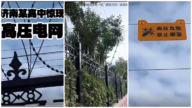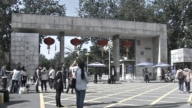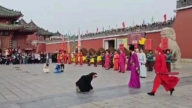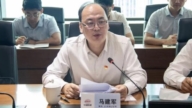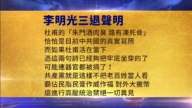【新唐人2012年10月9日讯】明年7月份将开始实施的《出境入境管理法》明确规定,定居国外的中国公民要回国定居,必须提前申请,经过批准方可入境。这引来民众和专业人士的质疑与批评。有分析认为,当局这一规定,可能试图限制一些中共不喜欢的人回国。
今年6月,中共第十一届全国人大常务委员会批准通过了新的《出境入境管理法》。这一新法的第二章第十三条规定:定居国外的中国公民要求回国定居,应当在入境前向驻外使馆、领馆或者外交部委托的其他驻外机构提出申请,也可以由本人或者经由国内亲属,向拟定居地的县级以上地方人民政府侨务部门提出申请。
对比发现,1994年大陆当局发布的《出入境管理法实施细则》第三章第十条也有类似规定,只不过在经由国内亲属申请的情况下,老的规定要求向公安局提出申请,而新的规定则变为向隶属中共统战部的侨务部门申请。
新的《出境入境管理法》对这一规定的保留,使众多定居海外的中国公民感到费解和不可思议。
网友批驳:太无理了,等于变相可以剥夺公民身份,全世界没有这样的事!
但也有网友非常乐观的说:“大家耐心等一等,共党明年就要垮台了,大家就好开开心心把家返啦。”
大陆律师张卉向《新唐人》表示,这一规定很奇怪。其他国家,比如加拿大,都没有这种对本国公民的出入境限制。
大陆律师张卉:“你没有入(外国)籍、你还是中国公民的时候,国家就这样限制你的出入境的话,我觉得就很不正常。那也可能是这样一种趋势,你们走了的就不要再回来。但是也是不可能的,如果是基于这样一个考虑的话,我觉得也是比较可笑、比较幼稚的。”
中国问题分析人士何岸全分析,这一规定似乎是当局要把海外中国公民当成外国人来对待。而中共这样做的目地很可能一个是为了敛财,一个是为了“维稳”。
中国问题分析人士何岸全:“虽然你是中国公民,比如说很多海外流亡人士为了坚持民主运动,他们坚持不拿美国护照,拿中国护照。那么它就为了防止这些人回国。我觉得从政治方面考量,可能在这方面也是属于‘维稳’的新的手段。”
目前定居美国的原大陆人士李先生也认为,从法律上讲,这个规定有违反宪法的嫌疑。
原大陆人士李先生:“其实它还是要对人进行控制。中国自从49年以后实行户口制度,一直对人实际上是一种控制。那中国人到海外之后它相对控制的比较少了,一回国,它又有机会了,又去控制。”
另一方面,民众对这一条款具体如何执行,如何明确界定“什么是回国定居”等概念,感到费解。而有中共驻外领馆工作人员在接受媒体询问时也表示,对于这一新法规,领馆目前还没有接到相应的具体实施办法。
采访/刘惠 编辑/李谦 后制/君卓
Only Approved Overseas Chinese Citizens Can Return to China
From July 2013, any overseas Chinese citizens will have
to get prior official approval before returning to China to live.
The Chinese Communist Party (CCP) regime’s
new regulation has led to public doubt and criticism.
People are speculating that this may be the CCP’s
new way to restrict dissidents from entering China.
This June, CCP authorities approved a new regulation
for the immigration and emigration of Chinese citizens.
The law stipulates that Chinese citizens residing abroad,
but who want to return to China to live, need to apply
to CCP diplomatic units before they can enter the country.
It is similar to the 1994 version of the exit /entry regulation.
The difference is which department
is now making the decision of acceptance.
Previously, it was the Public Security Bureau, and
now it is the Overseas Chinese Affairs Department.
The Overseas Chinese Affairs Department works directly
under authority of the CCP United Front Work Department.
The new law maintains the stipulation that restricts Chinese
citizens’ entering China, which has perplexed the public.
A netizen criticized, “how unreasonable it is!
It amounts to depriving people of citizenship.
This happens nowhere else in the world!”
Another netizen wrote, “we just need a little
more patience until the CCP collapses in 2013.
Then we’ll be able to return home, happily.”
Chinese lawyer Zhang Hui thinks
the stipulation is very strange.
In other democratic countries like Canada, there
are no exit/entry controls over its own citizens.
Zhang Hui: “I think it’s irrational to restrict
Chinese citizens’ entering and leaving China.
It may be the regime’s logic that since you
have left China, you won’t be welcomed back.
But this is unreasonable and absurd thinking, in my mind.”
Political observer He Anquan comments that this
regulation seems to treat overseas Chinese as foreigners.
Behind it, the motives of the CCP authorities
may be to collect money and to ‘maintain stability’.
He Anquan: “For example, many overseas Chinese
exiles still hold People’s Republic of China passports, for the sake of democratic movement.
They’re the targets that are blocked
from entering China by the regime.
This can be viewed as a new tactic for ‘stability preservation.”
Mr. Li from mainland China is now living in the U.S.
He thinks that the regulation is against China’s constitution.
Mr. Li: “In essence, it still aims to control the people.
In 1949, the Hukou system (forced family
registration) was promulgated across China.
The regime has long controlled Chinese people until today.
By contrast, the overseas Chinese are beyond its reach.
Thus, it sees the time when overseas Chinese return
to China as a chance to continue its control.”
The issue of how to implement this new regulation,
and how to define the concept of “settle in China", has also puzzled the public.
Staff of CCP diplomatic units stated in interview that they
have not yet received specific measures for implementation.


